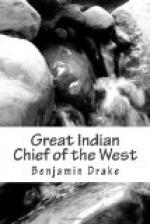Black Hawk is a remarkable instance of an individual, in no wise gifted with any uncommon physical, moral or intellectual endowments, obtaining, by the force of circumstances, the most extraordinary celebrity. Since the year 1831, his name has been familiarly known to the people of the United States; and the terror, which for a brief period, it excited upon the frontiers of Illinois, Missouri and Indiana, was only surpassed by the curiosity which pervaded every part of the union, to behold this notable chief of the woods, after he had been conquered, and was carried a prisoner of state, from the wilds of the West to the Atlantic sea-board. His tour through the United States, partook largely of the triumphal march of a successful hero. In the number of persons who flocked around him, the honors which he received were scarcely less flattering than those awarded to the illustrious Lafayette, while the “nation’s guest.” In the one case there was curiosity alone, in the other, curiosity and gratitude blended. To the casual observer, the distinction between the two cases is not very apparent.
The causes which created a desire so universal, to behold this aboriginal chief, have awakened a corresponding interest in the public mind, to learn more of his history, than was revealed in the events of the campaign of 1832. To gratify this curiosity, is the object of the present volume. The author has carefully consulted all the sources of information, touching the life and character of Black Hawk, that were within his reach; and has studiously avoided the presentation of any fact which did not seem to be well authenticated. Should the incidents here narrated, in the life of this celebrated Indian, not prove as rich and amusing as might be anticipated, from the wide spread notoriety which he has obtained, the work will still be found of some value. It presents in a connected form, and as the author trusts, with historic accuracy, one link in the great chain of political relations between the United States and the Indian tribes of North America. Every day is increasing the interest and magnitude of these relations, and any effort to preserve the facts with which they are associated, would seem to be worthy of public consideration. Black Hawk may die, his name be forgotten, and the smoke of his wigwam be seen no more, but the “Black Hawk war” will long form a page of deep interest, in the history of this country.
The subject of this memoir is by birth a Sac, having been born at the principal Sac village, on Rock River, in the year, as he himself states, 1767. His father’s name was Py-e-sa, his grandfather’s Na-na-ma-kee or Thunder. Black Hawk was not by birth a chief, but at the early age of fifteen, having distinguished himself by wounding an enemy, he was permitted to paint and wear feathers; and was placed in the rank of the Braves. About the year 1783, he united in an expedition against the Osages, and had the good fortune to kill and scalp one of the enemy:




